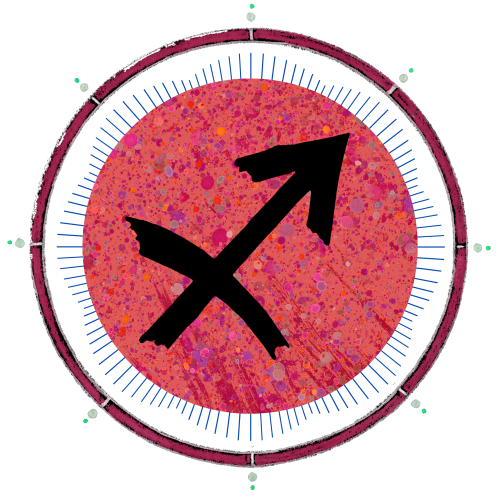Dear Friend and Reader:
A few months ago I was a guest on Caravan to Midnight, a popular nightly Internet video interview program, invited on to talk about Monsanto’s fraudulent way of doing business and poisoning our bodies. I gave a recitation of the company’s key points of history back to its founding in 1901, and up through the three major phases of its GMO career.
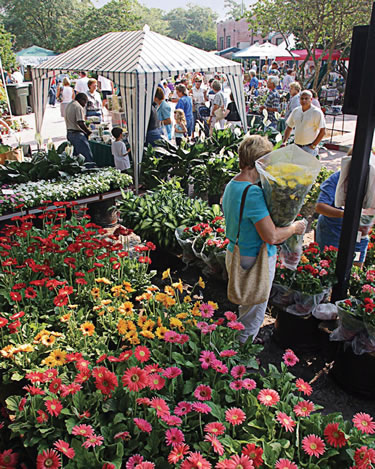
Toward the end of the discussion, which I will admit was as disturbing as the description of any mass murder scene, host John B. Wells asked me what I would do if I was president. Of the United States, that is. How would I save the world? I thought about it for a moment and I said I would suggest people have lots of potluck dinners.
Yes, were I the commander-in-chief, I would say: “Go forth and meet up somewhere with your casseroles! Don’t forget to keep it gluten-free if you can.”
I know this is not very superhero-like. I know it contradicts the notion that when something horrific happens, we will finally all wake up. We tried that experiment — it was called 9/11. That event shocked most people into a deeper, angrier trance.
Community dinners will help us come out of the fear trance. We need to take some time and get together, be together, experience one another’s humanity, and share food, companionship and ideas. Plus, at the end of the night, no money is exchanged. It is wholesome to have some places in life free from the marketplace. We need exchange, not the medium of exchange.
Regularly held social meals would address many problems associated with the cold alienation of both our typical social interactions, and of the Internet. They would remind us that we actually have neighbors, who have faces, names and voices — and who eat food. Food is the bottom line for everyone.
As figures on the Internet, we eat bandwidth and electricity, we have publicity photos and often use alias names. Nobody actually eats food. You cannot attach a pie as a PDF. Said another way, the Internet is disembodied and denies the existence of the body, which happens to be our main connection to life.
Food is also the bottom line of global warming. Besides fires, floods, droughts and various other dramas that may involve seeking high ground, the first place we’re going to feel the most brutal effects of global warming is on the food supply. Whatever the purveyors of hydroponics and DNA cut-and-paste potatoes may try to convince us of, food comes from seeds, land, water and sunshine — and the efforts of farmers. I know it seems unbearably quaint.
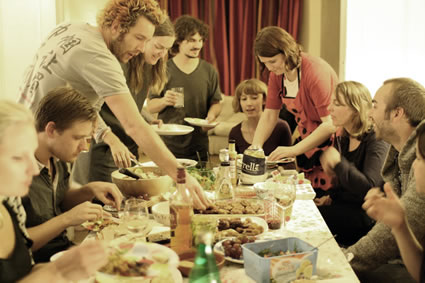
When the climate is disrupted, food production is disrupted. There are a lot of people on the planet right now, and we all need to eat. When food production is interrupted, chaos can and often does ensue. (It’s one of the problems that Syria is facing.)
A few weeks ago, there was a major international global warming conference in Paris. I think most people view this positively — 188 nations actually agreed on something. In a recent op-ed piece in The New York Times, Thomas Friedman wrote, “I had low expectations for the U.N. climate meeting here, and it met all of them — beautifully. I say that without cynicism.” He added that now “we have a chance to meet what scientists say is our key challenge: to avoid the worst impacts of global warming” and also to “manage those impacts that we can no longer avoid. That is a big, big deal.”
That same week, I had a guest on Planet Waves FM (my now Pacifica Radio affiliated community program) who was not so chipper. His name is Albert Saldamando, and he’s a human rights attorney who attended the conference as a negotiator on behalf of indigenous people.
“The Paris accord is a trade agreement, nothing more,” he said. “It promises to privatize, commodify and sell forested lands as carbon offsets in fraudulent schemes. These offset schemes provide a financial laundering mechanism for developed countries to launder their carbon pollution on the backs of the global south.”
I’m not sure if that was one of Mr. Friedman’s low expectations, though I think he sees the whole carbon trading thing differently. Carbon trading, if you’ve never heard of it, works like a commodities market, only the commodity traded is pollution.
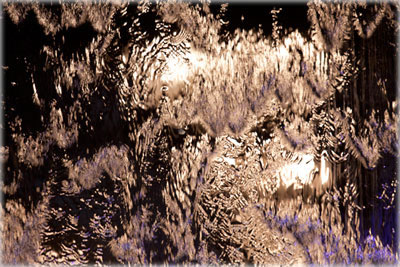
Saldamando continued, “Case-in-point, the United States’ climate change plan includes 250 million megatons to be absorbed by oceans and forest offset markets. Essentially, those responsible for the climate crisis not only get to buy their way out of compliance but they also get to profit from it as well.”
In other words, the Paris accord is in part a carbon trading agreement, which does things like allow PE&G, a huge power company in California, to buy its way out of 80% of its responsibility without actually cutting its emissions. They get to keep them going, profiting from their pollution. Someone else has to make the cuts.
For what it’s worth, I cast the astrological chart for the adoption of the motion that sealed the deal, and the chart basically said that the business of the world is business. When Saldamando later called it a trade agreement, I had even better words to describe the chart.
Saldamando said that if we utterly stopped burning carbon for fuel right now, the world might come in under the 1.5 degrees celsius warming goal that the Paris agreement purports to endorse and even facilitate.
Without agonizing over this too much, it means that we’re on our own. Big daddy ain’t gonna make himself behave or stay sober. We’ll never change his mind about saving the planet. We might get governments to do a little, or to block good things a little less, but their reins are really in the hands of corporations. It is these massive conglomerates, or trusts, that we must go after. By we I mean us.
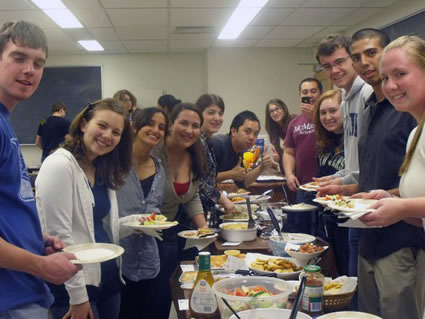
If you read somewhere that a bunch of people in Sweden had organized the whole country to divest from petrochemicals, you would think, how smart of them. Scandinavia, they are so evolved and civilized. If it wasn’t so chilly and they had better pizza, I might live there.
If I said we can do that in the United States, you might say we’re just too big a collection of douche bags to get anything of the kind accomplished. We’ll all just disagree for the unmitigated joy of vapid controversy — while the ice caps melt and the oceans gradually turn to acid. Seawater is supposed to be alkaline. When it becomes acidic (from all the carbon dioxide that it’s absorbing on our behalf), it’s habitable mostly to slime. Nothing against slime by the way — maybe it will spawn a new evolutionary line of superbeings immune to toxicity. This will come in handy in the future.
Then there are our business leaders — complacent, lazy, selfish, naive, short-sighted capitalists who can’t see or act beyond self-interest.
Yes, Americans long ago decided we’re just too stupid and self-centered to give a toss about something as ridiculous as our planet. But doesn’t that really, really annoy you sometimes? Like watching the guy who’s squirting charcoal starter on an already-lit barbecue. You’re thinking, he doesn’t know that the reason you’re not supposed to do that is because the fire can jump up the stream and make the can explode. Or maybe he does know. And you’re wondering whether it will happen this time, secretly thinking it sure would be interesting if it did.
Welcome to global warming. So, we are on our own. Those of us who, you know, get it. Even a little.
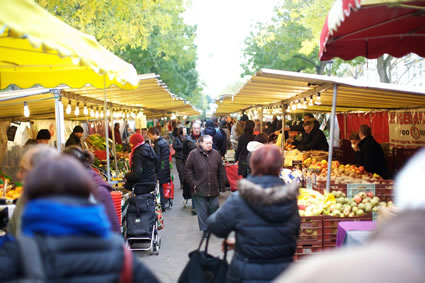
Recently a friend wrote to me on the topic of climate and said that “we can’t all be activists on the ground.”
I wrote back, “Much of the activism we need to do is, like, spend money in the right places. It’s economic activism, which would be spurred by information activism (i.e., reporting, analysis, story telling, etc.). Shifting money to the better parts of the economy is a real thing. Divestment toppled Apartheid.”
She wasn’t born at the time, so she can’t quite know the thrill of realizing in real time that the town board of Turtle Turd, New Mexico, voting to remove its investments from businesses working with South Africa actually helped win the issue. Seemingly intractable white-superior culture there just collapsed from economic starvation. Then Nelson Mandela not only got out of jail, he became president.
I continued to my friend, “So ultimately the issue really is spiritual in that it involves awareness, relationship to existence and putting one’s money where one’s ethics are. That and conserving, simplifying. No part of this is about marching in the streets. More like my solution to everything, the potluck dinner.”
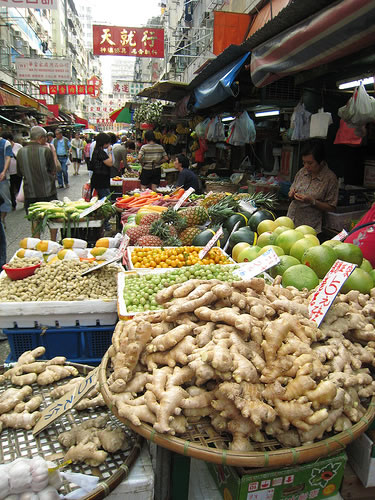
She replied: “The potluck dinner is a solid solution. That is why our connection to each other matters. When we break bread with each other, by itself that is magic in that it is humanizing. People who see the humans in the community they share meals with are more likely to apply that framework of perception to communities outside their immediate ones.”
Divesting from petrochemical giants includes spending money in one’s neighborhood as a matter of course. For example, if you shop at the local farmer’s market, that broccoli or onion did not require being trucked 2,500 miles across the country. It also requires stitching ourselves more closely into the local economy.
Those words are tossed around, but there is such a thing. You discover it more as you engage in it more; it starts to seem real because it is. However, what you will also notice is that everything you get is better quality, and it’s great to do business with an actual human.
Doing this starts to seem increasingly productive and important, and then you may get hooked and start doing things with a sense of principle and satisfaction that you’re getting something done. No matter how small, it’s actually part of the solution that will work. You might start to get other people involved, inviting them to the party. No ‘protesting’ involved. No risking Tasers or pepper spray, unless Homeland Security one day deems farmer’s markets a terrorist threat.
As for those potluck dinners: we need a place to get to know one another, that is designed for sharing, and to be social, where no money is exchanged. The more we know our neighbors, the more of a mutual resource we can be. This goes against the very principle of toxic capitalism: every man, woman and child for themselves.

It’s exactly the opposite of divide and conquer: let’s get together and be real. Real is strong, and familiar is becoming ever more necessary in a world where we’re facing some serious “security” challenges (such as closing the Los Angeles school district due to an email, and all its implications).
Plus, group dinners create resources and diversity with a low carbon footprint. And who knows, someone might bring a vegan version of that mushroom meatball stroganoff you love.
Anything that can remind people how to cook is worth doing for its own sake, anyway. I’m about to bring out a book called The Lost Art of Making Your Own Scrambled Eggs. People in a community, taking part in any modest reminder that because we’re together everyone gets to eat, is unusually reassuring if you’ve never experienced it before. A camp I stayed in at Burning Man a few years ago had a strong ethos of food organization, and as a result could also have a policy of feeding any wayfarers who wandered in.
What I’m suggesting here isn’t even sappy enough to make you feel dumb for being idealistic. And while it may feel strange to socialize in person, you’ll get over it pretty quick.
With Love,




